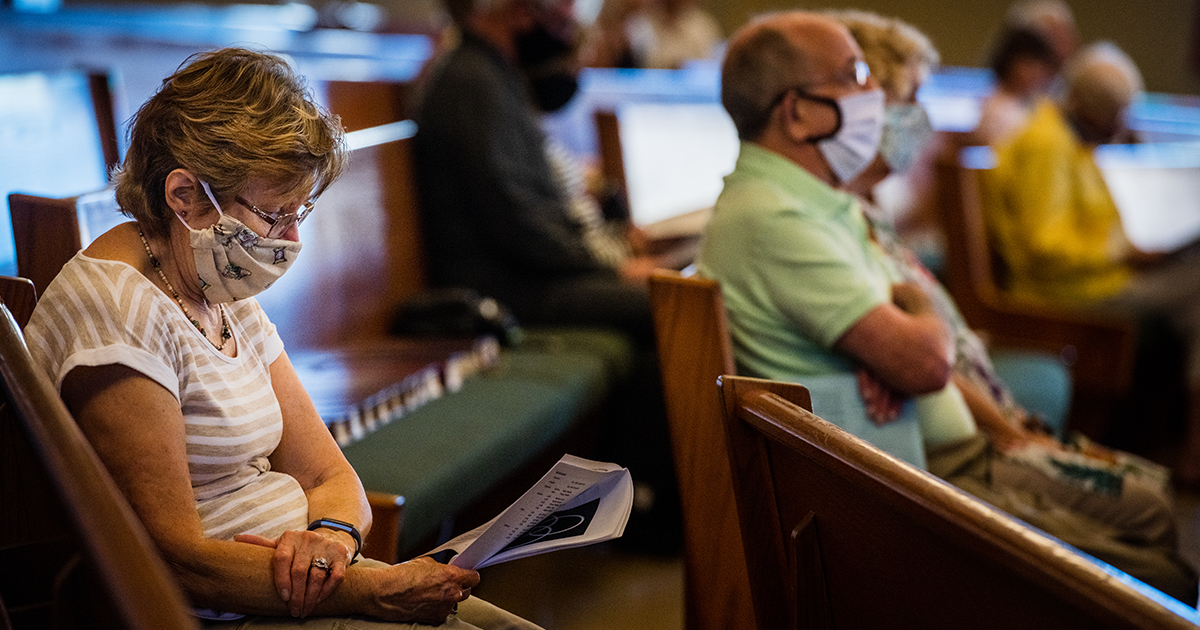
By Megan K. Mertz
2020 has been an unpredictable year, and the long-term repercussions of the COVID-19 pandemic are only just starting to emerge.
In an effort to begin to examine the pandemic’s impact on the Synod, LCMS Rosters, Statistics and Research Services sent a survey to every congregation with a valid email address — 4,787 in total — in June. More than 1,200 congregations responded, providing a representative sampling of what’s going on in congregations of every size, district and community type (urban, suburban, rural).
While many of the survey results are in line with what one might expect, there were a few surprises and bright spots regarding congregational finances and the Synod’s ability to walk together during difficult times.
Moving online
Congregations in every LCMS district faced restrictions in some form or another. Approximately 67% of respondents were located in communities that restricted churches from gathering for in-person worship. Only 5% of congregations reported being able to meet as usual, and less than 15% met in person for Easter.
Instead, most churches moved online. About 80% of congregations used the internet to livestream or post recordings of services or sermons — up from 45% prior to the pandemic. Going forward, 70% plan to continue posting online, and nearly half of all respondents will continue livestreaming services or sermons.
Among this group, Facebook was by far the most popular platform used, although many churches also used YouTube and/or their own website.
Even though members were still able to attend worship through online platforms, the survey revealed that other areas of congregational life suffered as a result of restrictions. Roughly half of congregations canceled or postponed meetings, confirmations and vacation Bible school. Instead, they focused on providing midweek Bible studies or devotionals online (67%), offering the Lord’s Supper on an individual or family basis (59%), and making an intentional effort to contact every member household at least every two weeks (56%).
This sudden shift wasn’t without consequences for the Synod’s workers, however. Approximately 80% of senior or sole pastors in the survey report that they have been busier than normal, and 65% of rostered workers who took the survey say that they are personally worn down by the added stress of the pandemic.
Reason to hope
There’s no question that the pandemic has taken a financial toll on many Americans, who may have been laid off or furloughed during the shutdown. Based on the survey results, LCMS Rosters, Statistics and Research Services estimates that nearly 65,000 LCMS households have lost income.
And yet, early signs suggest that this situation and the economic upheaval it has caused may be less severe for churches than originally thought. Most congregations have not had giving decrease due to the pandemic. Less than 12% say that it is down significantly, while more than 25% report that giving is actually up from the previous year.
Nearly 90% of respondents believe that they will get through this time with only minor budget cuts, and the same percentage do not expect to make any reductions to payroll budgets.
However, the news wasn’t quite as promising for congregations that own or operate a school. Those respondents were more likely to say they will need to make “significant budget cuts.” There were also a handful of small (weekly attendance less than 150) and very small (weekly attendance less than 35) congregations that were facing “serious” budget issues.
Other bright spots
Despite the ongoing uncertainty, the survey results highlighted several reasons to be optimistic about the future:
- 75% of congregations say their members more clearly see the importance of their Lutheran identity.
- 92% of congregations had returned to in-person worship (approximately half of those at reduced capacity) by July 5.
- The majority have a highly favorable view of the support they’ve received from their district, the Synod and their neighboring LCMS congregations.
In addition, over 40% of congregations say they have no major needs at this time, and nearly another 30% say they only have a few needs. Most of the needs brought by congregations are relational — such as how to minister amid social distancing — rather than programmatic or logistical.
“I was encouraged by the overall resilience of our congregations and their determination to continue to proclaim Christ come what may,” LCMS President Rev. Dr. Matthew C. Harrison said of the results. “And despite the challenges, the evidence of collegiality and trust in circuit, district and Synod is a blessing in our life together.”
Posted Aug. 25, 2020